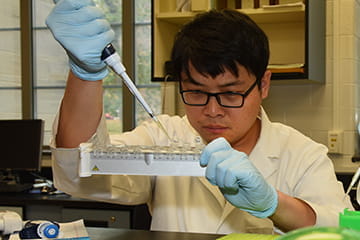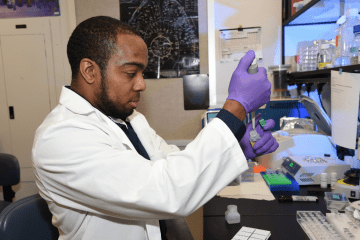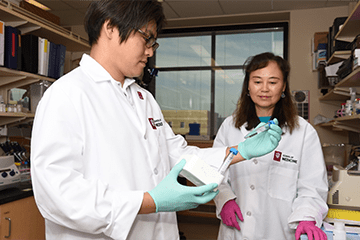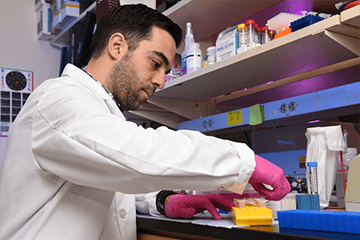Opportunities for pursuing multi-disciplinary research exist due to active, ongoing scientific collaborations among preceptors. A significant emphasis is to promote and foster the development of the next generation of biomedical researchers committed to scientific careers in academic medicine to become independent investigators. Training programs are available in the areas of hematopoiesis, gene transfer/gene therapy, immunology and infectious disease and cancer biology. A training program for medical scientists leading toward a combined MD/PhD degree is also available.

Hematopoiesis
This program emphasizes a multidisciplinary approach to understanding hematopoietic cell regulation and accepts three predoctoral and four postdoctoral students each year. Productive preceptors provide extensive training in highly active and interactive research laboratories pursuing advanced research on the cellular and molecular biology of hematopoiesis, immunological aspects of gene expression, role of transcription factors, intracellular signals and antigen presentation, mutational analyses of genes and genetic diseases, experimental therapeutics, gene transfer/gene therapy of hematopoietic disorders and pediatric and adult stem cell transplantation.
The scientific development of the trainee is facilitated by a research committee composed of preceptors with multi-disciplinary research interests. Major resources that are available include internationally recognized clinical and basic science research programs, an NCI-designated cancer center, an NIH-designated national gene vector laboratories, an NIDDK funded center of excellence in molecular hematology and state of the art infra-structure.

Gene Transfer and Therapy
Supporting three predoctoral trainings and five postdoctoral students per year, this training program has a strong emphasis on cell and molecular biology/immunology of gene therapy. Faculty provide extensive training in highly interactive laboratories pursuing research on fundamental aspects of cellular, molecular biological and immunological aspects of human disease.

Immunology and Infectious Disease
A nationally recognized training program, immunology and infectious disease at IU School of Medicine specializes in areas of allergy and asthma, autoimmunity, biodefense, immune cell development and differentiation, innate immunity, host-pathogen interactions, transplantation, tumor immunity and virology. Support for training graduate students and fellows is provided by the National Institute of Allergy and Infectious Diseases at the NIH. Scientific advances in the fields of immunology and infectious disease research significantly impact human health and the treatment of disease. Novel approaches to vaccine development to combat tumors and pathogens are required, as well as the development of novel therapeutics for asthma and autoimmune disorders. Email Mark Kaplan, PhD for additional information on this program.

Cancer Biology
Through the defining of molecular and cellular immunological mechanisms relevant to tumor immunology, laboratories at IU School of Medicine are furthering curative therapies and understanding the regulation of human papillomavirus gene expression and host cellular responses have important implications in preventing cervical cancer. For more information about this training program, email Harikrishna Nakshatri, PhD.